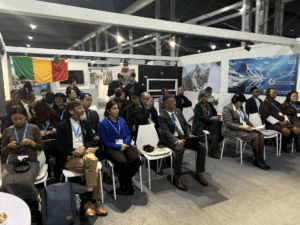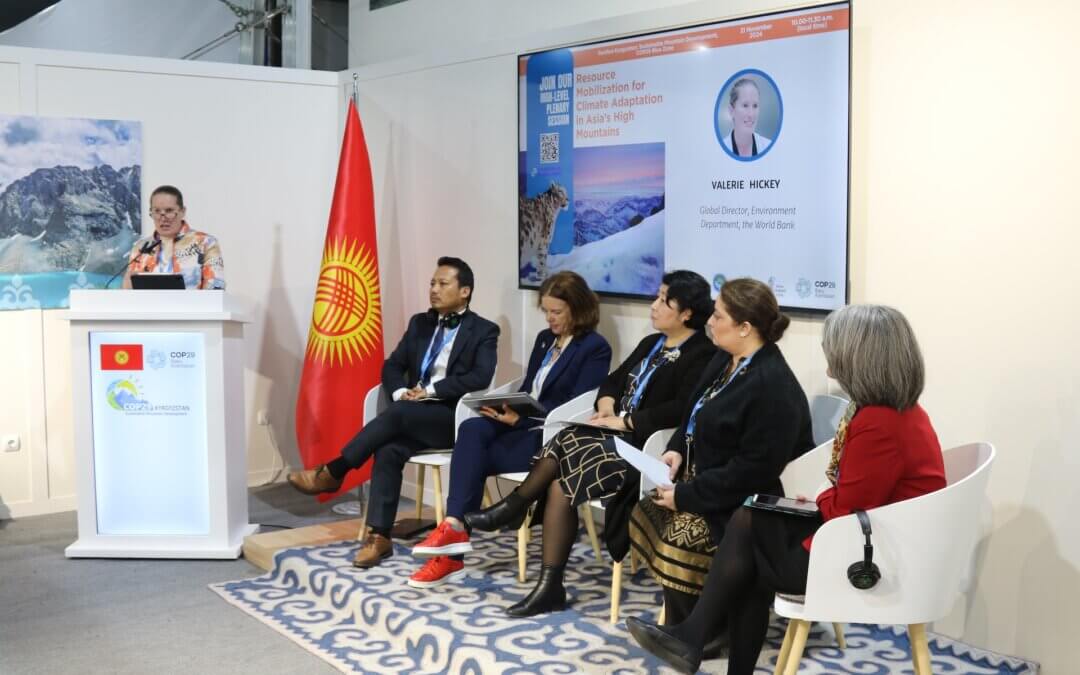BAKU, Azerbaijan, November 21, 2024 – A high-level plenary session at the UNFCCC COP29, titled “Resource Mobilization for Climate Adaptation in Asia’s High Mountains,” brought together global leaders, climate experts, and representatives from snow leopard range countries to address the urgent need for increased investment in climate adaptation for these fragile ecosystems. Held at the Kyrgyzstan Pavilion in the Blue zone of COP venue, the session was co-organized by the Global Snow Leopard and Ecosystem Protection Program, Ministry of Natural Resources, Ecology and Technical Supervision of the Kyrgyz Republic, and International Snow Leopard Trust. The event underscored the crucial role of these mountains in regulating climate, preserving biodiversity, and ensuring water security for billions of people, while also acknowledging the severe threats posed by climate change.
Dinara Kemelova, Special Representative of the President of Kyrgyzstan, welcomed the panelists with a plea for global cooperation and financial support.
Romina Khurshid Alam, Coordinator to the Prime Minister of Pakistan on Climate Change, highlighted the region’s extreme vulnerability and called people’s attention to her country as one of the top five nations most affected by climate change. She advocated for collective action to combat environmental crises, proposing the snow leopard as a symbol of climate change impact and emphasizing the need to protect both wildlife and human livelihoods.
Valerie Hickey, Global Director for Environment at the World Bank, stressed the importance of combining traditional knowledge with modern technology to empower mountain communities in addressing climate risks. She highlighted the Resilient Landscapes Restoration Project as an example of cross-border collaboration and nature-based solutions that can protect ecosystems, support sustainable development, and promote resilient tourism.

Tshewang Dorji, Climate Change Specialist at the Global Environment Facility (GEF), mentioned the continued support in grant funding by GEF since the 1990s for snow leopard conservation across 11 range countries. He emphasized the importance of putting people at the heart of conservation efforts, balancing the protection of keystone species with the needs of local communities.
Izabella Koziell, Deputy Director General of ICIMOD, underscored the necessity of regional collaboration to tackle the climate crisis in the Hindu Kush Himalaya, home to nearly 2 billion people and Asia’s largest river systems. She drew attention to the significant disparity in climate financing, noting that only a fraction of global adaptation funds reaches the most vulnerable communities.

Yoko Watanabe, Director of ADB’s Climate Change, Resilience, and Environment Cluster, stressed the importance of integrated landscape approaches to conservation and adaptation in high mountain regions. She highlighted ADB’s efforts to address severe impacts such as glacial melt, land degradation, and threats to upstream and downstream communities.

The event also invited interventions from representatives from Mongolia and Uzbekistan who echoed the need to incentivize regional and trans-boundary initiatives and specific resource mobilization for these. Representatives from USAID and GEF Small Grants Program responded to specific interventions and shared details about on-going and upcoming opportunities for resource mobilization for climate adaptation especially in regions that mandate regional cooperation.
Key discussion points included:
- Recognizing the value of ecosystem services: Participants emphasized the significant but often overlooked economic and social benefits of mountain ecosystems.
- Addressing funding gaps: Greater investment in climate adaptation measures is essential, especially for high mountain regions.
- Enhancing international cooperation: Collaborative efforts are needed to address the cross-border impacts of climate change.
- Engaging local communities: Effective conservation efforts require active involvement from the people most directly affected.
The session was concluded with a call to action by Ms. Asel Raimkulova, Deputy Minister of Natural Resources of Kyrgyzstan. She highlighted the alarming rate of glacial melt in the region and its cascading effects on water security and livelihoods. “The future of Asia’s high mountains depends on the decisions we make today,” she stated, urging collective efforts to build climate-resilient communities and protect these vital ecosystems. She emphasized the need for unified efforts to combat these challenges and announced that Kyrgyzstan will host the next meeting of the Steering Committee of the Global Snow Leopard and Ecosystem Protection Program (GSLEP).
The session, moderated by Dr. Koustubh Sharma, International Coordinator, GSLEP Program reinforced the critical need for resource mobilization and cross-sectoral collaboration to secure a sustainable future for Asia’s high mountains. The event was attended by nearly 45 participants including on-site and online audience.




